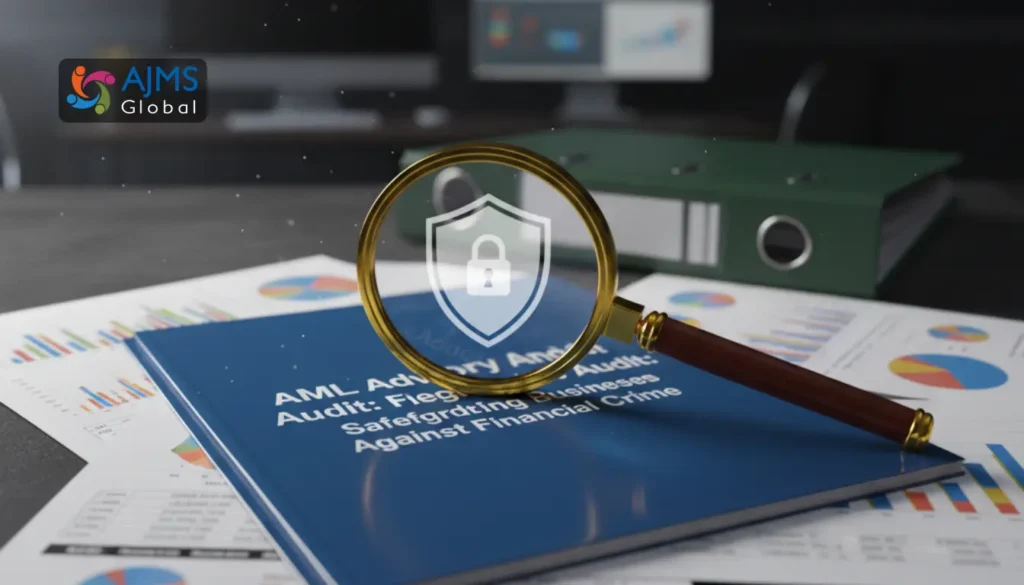Financial crime is evolving rapidly, and businesses today are operating in an environment where regulatory scrutiny, technological advancements, and cross-border risks are at their peak. Among these risks, money laundering and terrorist financing remain two of the most serious threats to global financial stability. Beyond financial penalties, companies implicated in such activities face reputational damage, loss of investor confidence, and in severe cases, restrictions on business operations.
This is where Anti-Money Laundering (AML) advisory and audit services play a critical role. They are not simply about checking compliance boxes. They form the backbone of a company’s defense against financial crime.
Table of Contents
ToggleUnderstanding AML Advisory
AML advisory refers to expert guidance provided to organizations to help them identify, mitigate, and manage money laundering and terrorism financing risks. The focus is on designing frameworks that not only comply with regulatory requirements but also align with the organization’s business model and risk appetite.
An effective AML advisory framework typically addresses:
- Risk Identification: Mapping customer profiles, business activities, and geographic exposures to understand where vulnerabilities exist.
- Policy Development: Drafting AML and Counter-Financing of Terrorism (CFT) policies tailored to industry needs and in line with global standards such as FATF guidelines.
- Technology and Automation: Advising on advanced monitoring systems, AI-driven anomaly detection, and sanctions screening tools to improve efficiency.
- Capacity Building: Conducting regular training sessions to ensure employees can detect red flags and escalate issues appropriately.
By embedding AML measures into daily business operations, organizations move from reactive compliance to proactive risk management.
The Role of AML Audits
While advisory services help build the framework, AML audits ensure that those frameworks are effective, practical, and regulatory-compliant. An audit is essentially a health check of an organization’s AML controls.
A comprehensive AML audit involves:
- Program Review – Assessing whether governance structures, reporting lines, and compliance responsibilities are clearly defined.
- Control Testing – Checking if customer due diligence (CDD), enhanced due diligence (EDD), and transaction monitoring are being carried out properly.
- Data Accuracy – Validating the quality of records, from KYC documentation to suspicious transaction reports (STRs).
- Gap Analysis – Identifying deficiencies, such as outdated policies, weak monitoring thresholds, or inadequate staff awareness.
- Actionable Recommendations – Providing a roadmap for remediation with clear timelines and accountability.
Regular AML audits not only prepare businesses for regulatory inspections but also create a culture of accountability, ensuring that compliance becomes part of the organization’s DNA.
Why Advisory and Audit Go Hand in Hand
Advisory and audit are two sides of the same coin. Advisory helps organizations build the right compliance framework, while audits ensure that framework works effectively in practice. Without advisory, organizations may lack a strategic vision for AML. Without audits, even the most well-drafted policies can fail due to poor implementation.
Together, they:
- Strengthen defenses against sophisticated financial crime.
- Enhance transparency for regulators and stakeholders.
- Foster a culture of compliance across the organization.
Benefits Beyond Compliance
The true value of AML advisory and audit goes far beyond meeting regulatory obligations. Businesses gain:
- Reputational Protection – Demonstrating a strong AML posture builds trust among customers, partners, and investors.
- Operational Efficiency – Streamlined processes reduce manual errors and improve detection capabilities.
- Competitive Advantage – In a highly regulated market, companies with strong AML systems attract global investors and partnerships more easily.
- Future Readiness – Advisory keeps organizations ahead of regulatory changes, while audits ensure ongoing alignment.
In today’s climate, where authorities levy multi-million-dollar fines for compliance lapses, investing in AML advisory and audits is not optional, it is a business imperative.
Real-World Implications
Consider global enforcement cases where financial institutions faced fines running into billions of dollars for AML lapses. These were not failures of intent but failures of systems and controls—weak risk assessments, overlooked due diligence, or ineffective monitoring. The cost of such failures is not just financial; reputational recovery can take years, if at all.
By contrast, businesses that invest in regular AML advisory and audits position themselves as trusted market participants. They can confidently expand into new markets, onboard new customers, and partner with financial institutions without fear of compliance setbacks.
Building a Culture of Compliance
Perhaps the most important outcome of AML advisory and audits is cultural. When compliance becomes embedded into the values of a company, employees understand that safeguarding against financial crime is not just the responsibility of compliance teams, it is a collective responsibility.
This cultural shift requires commitment from leadership. Boards and senior management must view AML not as a regulatory burden but as a strategic enabler. Advisory helps create this mindset, while audits reinforce it through accountability.
Conclusion
The fight against financial crime is not static. Criminals are constantly adapting, exploiting new technologies, and finding novel ways to infiltrate financial systems. To stay ahead, businesses must adopt a dual approach: strategic AML advisory to build resilient frameworks, and rigorous AML audits to ensure effectiveness and accountability.
Ultimately, AML advisory and audits are not just about avoiding fines, they are about safeguarding the business, protecting reputation, and ensuring sustainable growth in a world where trust and transparency are paramount.
This is where AJMS Global can make a difference. With deep expertise in regulatory compliance, financial crime prevention, and risk management, we help organizations design robust AML frameworks, conduct independent audits, and implement practical solutions tailored to their operations. By partnering with AJMS Global, businesses gain not only compliance assurance but also a trusted advisor committed to protecting their growth and reputation. In an age where financial crime can dismantle years of hard work in an instant, businesses that prioritize AML with the right advisory and audit support will not just survive, they will thrive.

